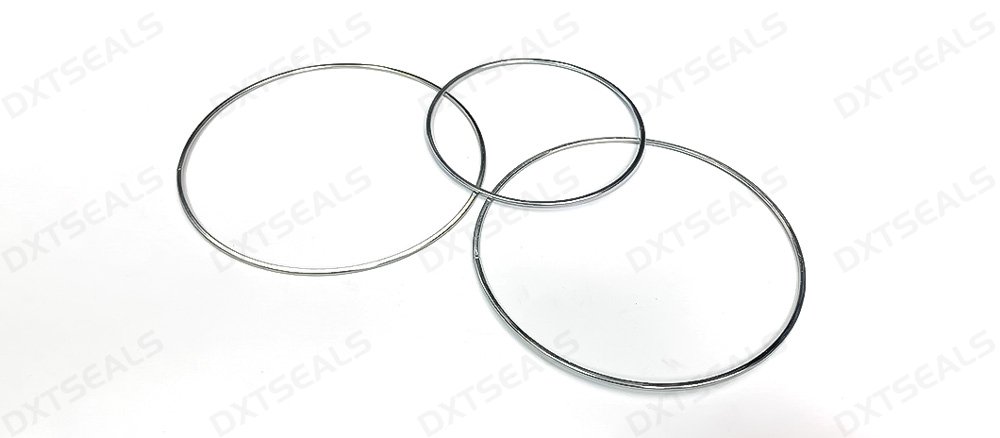
Metal O-ring seals are known for their durability and ability to withstand extreme conditions. These seals are used in industries where traditional rubber or plastic seals may fail due to high pressure, temperature fluctuations, or exposure to corrosive chemicals. In this guide, we will walk you through the factors to consider when choosing a metal O-ring seal and explore the industries and applications where they are commonly used.
1. What Are Metal O-Ring Seals?
Metal O-ring seals are circular sealing components made from high-strength metals such as stainless steel, Inconel, and other alloys. Their primary function is to create a tight seal between two surfaces to prevent the leakage of liquids or gases. Due to their material properties, metal O-rings offer greater resistance to extreme temperatures, pressures, and chemical exposure than their rubber counterparts.
2. Key Considerations for Selecting Metal O-Ring Seals
When choosing the right metal O-ring for your application, several factors must be taken into account:
- Material Compatibility: The type of metal used in the O-ring should be compatible with the fluids or gases it will come into contact with. For example, stainless steel is ideal for general use, while Inconel is used in applications involving corrosive chemicals or high temperatures.
- Pressure and Temperature Requirements: Metal O-rings are best suited for applications where high pressure and temperature fluctuations occur. Ensuring that the O-ring material can handle the specific conditions of your application is crucial for long-term reliability.
- Seal Design: The design and size of the metal O-ring should match the requirements of the equipment it will be used in. This includes considerations such as the O-ring's cross-sectional diameter, hardness, and compression set.
- Environmental Factors: If your application involves exposure to harsh chemicals, abrasive environments, or significant mechanical stress, selecting a metal O-ring with high corrosion resistance and durability is essential.
3. Advantages of Metal O-Ring Seals
- Extreme Durability: Metal O-ring seals are designed to withstand high-pressure environments, making them ideal for industries where failure can lead to costly downtime or safety hazards.
- Temperature Resistance: These seals can operate effectively in a wide temperature range, from cryogenic conditions to extremely high temperatures.
- Chemical and Corrosion Resistance: Metal O-rings offer excellent resistance to corrosion and chemical degradation, making them perfect for applications where the seal may come into contact with harsh or reactive substances.
- Longevity: Metal O-rings have a longer lifespan compared to rubber or plastic seals, reducing the need for frequent replacement and maintenance.
4. Common Materials for Metal O-Ring Seals
- Stainless Steel: Known for its strength, corrosion resistance, and ability to maintain its properties under a wide range of temperatures, stainless steel is a go-to material for many applications.
- Inconel: A nickel-chromium superalloy, Inconel is highly resistant to oxidation and corrosion, making it ideal for use in high-temperature environments such as jet engines and chemical reactors.
- Hastelloy: Another highly corrosion-resistant alloy, Hastelloy is often used in chemical processing industries where the seal is exposed to aggressive fluids.
5. Industries and Applications for Metal O-Ring Seals
- Oil and Gas: Metal O-ring seals are commonly used in oil and gas exploration and production equipment, such as valves, pipelines, and blowout preventers. These seals can withstand high-pressure environments and corrosive substances like crude oil and natural gas.
- Aerospace: Aerospace equipment operates under extreme conditions, from high temperatures in jet engines to the vacuum of space. Metal O-rings are used in fuel systems, landing gear, and hydraulic systems where reliability and durability are critical.
- Chemical Processing: In industries that deal with highly corrosive chemicals, metal O-rings provide an excellent seal and prevent leaks, ensuring safety and the integrity of the system.
- Power Generation: Metal O-ring seals are utilized in steam turbines, pumps, and high-pressure piping systems found in power plants. Their ability to handle high-pressure steam and hot gases makes them an essential component in maintaining efficient power generation.
- Pharmaceutical and Food Processing: Metal O-ring seals are used in sterile environments due to their resistance to chemical sterilization processes and high-temperature cleaning methods. In these industries, contamination control is vital, and metal O-rings provide the necessary sealing without degrading over time.
6. When to Use Metal O-Ring Seals Over Rubber Seals
While rubber O-ring seals are widely used across many industries, there are specific scenarios where metal O-ring seals are the superior choice. These include:
- High-Pressure Environments: In applications where pressure levels exceed the limits of rubber seals, metal O-rings provide a leak-proof solution.
- Extreme Temperature Fluctuations: Metal O-rings retain their properties in both cryogenic and high-temperature settings, where rubber seals may degrade.
- Corrosive Chemical Exposure: If your equipment is exposed to aggressive chemicals, metal O-rings are more resistant to chemical attacks, ensuring a longer service life.
- High Abrasion or Mechanical Stress: Metal seals are better equipped to handle mechanical wear and tear, providing a more robust solution for high-stress environments.
7. Conclusion
Choosing the right metal O-ring seal for your application requires an understanding of the specific conditions under which the seal will be used. Metal O-rings offer several advantages over traditional rubber seals, including superior resistance to pressure, temperature, and chemicals. Industries such as oil and gas, aerospace, chemical processing, and power generation rely on these seals for their reliability and durability. By carefully selecting the appropriate material and design, you can ensure that your equipment remains leak-free and operates efficiently in even the most challenging environments.
